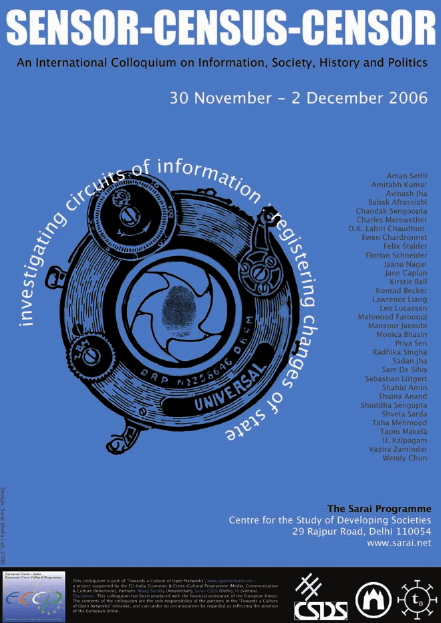Deibert, Palfrey, Rohozinski, Zittrain (eds.): Access Controlled: The Shaping of Power, Rights, and Rule in Cyberspace (2010)
Filed under book | Tags: · blogging, censorship, digital human rights, internet, internet filtering, internet governance, politics, technology, youtube

Internet filtering, censorship of Web content, and online surveillance are increasing in scale, scope, and sophistication around the world, in democratic countries as well as in authoritarian states. The first generation of Internet controls consisted largely of building firewalls at key Internet gateways; China’s famous “Great Firewall of China” is one of the first national Internet filtering systems. Today the new tools for Internet controls that are emerging go beyond mere denial of information. These new techniques, which aim to normalize (or even legalize) Internet control, include targeted viruses and the strategically timed deployment of distributed denial-of-service (DDoS) attacks, surveillance at key points of the Internet’s infrastructure, take-down notices, stringent terms of usage policies, and national information shaping strategies. Access Controlled reports on this new normative terrain.
The book, a project from the OpenNet Initiative (ONI), a collaboration of the Citizen Lab at the University of Toronto’s Munk Centre for International Studies, Harvard’s Berkman Center for Internet and Society, and the SecDev Group, offers six substantial chapters that analyze Internet control in both Western and Eastern Europe and a section of shorter regional reports and country profiles drawn from material gathered by the ONI around the world through a combination of technical interrogation and field research methods.
Chapter authors: Ronald Deibert, Colin Maclay, John Palfrey, Hal Roberts, Rafal Rohozinski, Nart Villeneuve, Ethan Zuckerman
Editors Ronald Deibert, John G. Palfrey, Rafal Rohozinski, Jonathan Zittrain
Publisher MIT Press, 2010
Information Revolution and Global Politics series
ISBN 0262514354, 9780262514354
656 pages
authors
publisher
google books
PDF (PDF chapters, Part 1)
PDF (PDF chapters, Part 2)
Access Denied. The Practice and Policy of Global Internet Filtering (2008)
Filed under book | Tags: · blogging, censorship, human rights, internet, internet filtering, journalism, politics

Many countries around the world block or filter Internet content, denying access to information—often about politics, but also relating to sexuality, culture, or religion—that they deem too sensitive for ordinary citizens. Access Denied documents and analyzes Internet filtering practices in over three dozen countries, offering the first rigorously conducted study of this accelerating trend.
Internet filtering takes place in at least forty states worldwide including many countries in Asia and the Middle East and North Africa. Related Internet content control mechanisms are also in place in Canada, the United States and a cluster of countries in Europe. Drawing on a just-completed survey of global Internet filtering undertaken by the OpenNet Initiative (a collaboration of the Berkman Center for Internet and Society at Harvard Law School, the Citizen Lab at the University of Toronto, the Oxford Internet Institute at Oxford University, and the University of Cambridge) and relying on work by regional experts and an extensive network of researchers, Access Denied examines the political, legal, social, and cultural contexts of Internet filtering in these states from a variety of perspectives. Chapters discuss the mechanisms and politics of Internet filtering, the strengths and limitations of the technology that powers it, the relevance of international law, ethical considerations for corporations that supply states with the tools for blocking and filtering, and the implications of Internet filtering for activist communities that increasingly rely on Internet technologies for communicating their missions.
Reports on Internet content regulation in forty different countries follow, with each country profile outlining the types of content blocked by category and documenting key findings.
Contributors: Ross Anderson, Malcolm Birdling, Ronald Deibert, Robert Faris, Vesselina Haralampieva, Steven Murdoch, Helmi Noman, John Palfrey, Rafal Rohozinski, Mary Rundle, Nart Villeneuve, Stephanie Wang, and Jonathan Zittrain
Edited by Ronald J. Deibert, John G. Palfrey, Rafal Rohozinski and Jonathan Zittrain
Publisher MIT Press, 2008
Series: Information revolution & global politics
ISBN 0262541963, 9780262541961
Length 449 pages
Sarai Media Lab (eds.): Sensor-Census-Sensor: An International Colloquium on Information, Society, History and Politics. A Report (2007)
Filed under report | Tags: · censorship, india, information society, neoliberalism, networks, politics, surveillance, technology

This book is a report on the International Colloquium that took place from November 30th, 2006 to December 2nd, 2006
Critical examination and investigation of the regimes and technologies of information harvesting, management, circulation and deployment as they have developed in India and Europe from early modernity till today.
The colloquium was organized by the Sarai Programme at CSDS, Delhi, in collaboration with the Waag Society, Amsterdam, and t0, Vienna, under the rubric of the network titled ‘Towards a Culture of Open Networks’
Sensor-Census-Sensor: Investigating Circuits of Information, Registering Changes of State
Produced and designed at the Sarai Media Lab, Delhi
Published by: The Sarai Programme, Delhi, India, November 2007
ISBN 9788190585378
PDF (PDF chapters, updated on 2014-8-29)
Comment (0)
